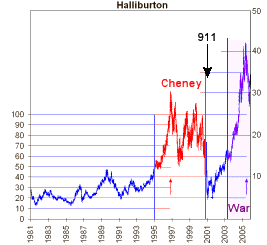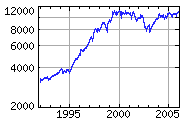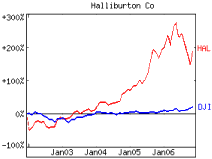I’m aware that I’ve avoided looking into Halliburton for the whole year that I’ve been doing this blog. I know that part of my avoidance is that it feels like one of those topics Rush Limbaugh would jump on if he were on our side. Who wants to sound like Rush Limbaugh? or Ann Coulter? But I think that I just haven’t wanted it to be true that our country is being run by Energy Companies. My recent explorations of the Cheney story has made it impossible not to take a peek.

| This graph is the history of Halliburton’s performance in the Stock Market [from Yahoo Finance]. The two upward pointing arrows near the bottom are when the stock split. So the graph is the "real" value of the stock though the units change. The period when Dick Cheney was C.E.O. is marked in red. The bombing of the Twin Towers in New York is marked with the downward pointing arrow [911]. The Iraq War is shown in purple. |
Halliburton has been around since 1919 in the business of drilling oil wells. Over the years, it has acquired various companies and adapted to the changes in oil production with the evolution of the automotive industry. George H.W. Bush worked for a company in the 1950’s, Dressler Dresser, that later became part of Halliburton. In the 1990’s, the company was involved in capping burning wells in Kuwait in the aftermath of the first Gulf War.
 After Clinton got elected and his tenure as Secretary of State ended, Dick Cheney spent a couple of years at the American Enterprise Institute think-tank with fellow Neoconservatives. Then, in 1995, he accepted a position as C.E.O. of Halliburton. To my knowledge, it was his first non-governmental job since going to Washington in 1969 as a Congressional Intern. Halliburton did well under Cheney, though it was a period when everyone was doing well [Dow Jones Average is shown on the right for comparison]. He remained, however, a player in the Neoconservative world and was one of the original founders of the Project for the New American Century in 1997. In 2000, Cheney headed up the search for George W. Bush’s Vice Presidential candidate, and the search ended up picking Dick Cheney. He resigned from Halliburton with a severence package, and was elected Vice President:
After Clinton got elected and his tenure as Secretary of State ended, Dick Cheney spent a couple of years at the American Enterprise Institute think-tank with fellow Neoconservatives. Then, in 1995, he accepted a position as C.E.O. of Halliburton. To my knowledge, it was his first non-governmental job since going to Washington in 1969 as a Congressional Intern. Halliburton did well under Cheney, though it was a period when everyone was doing well [Dow Jones Average is shown on the right for comparison]. He remained, however, a player in the Neoconservative world and was one of the original founders of the Project for the New American Century in 1997. In 2000, Cheney headed up the search for George W. Bush’s Vice Presidential candidate, and the search ended up picking Dick Cheney. He resigned from Halliburton with a severence package, and was elected Vice President:In recent years the company has become the center of several controversies involving the 2003 Iraq War and the company’s ties to U.S. Vice President Dick Cheney. Cheney retired from the company during the 2000 U.S. presidential election campaign with a severance package worth $34 million[7]. As of 2004, he had received $398,548 in deferred compensation from Halliburton while Vice President. Cheney also retains unexercised stock options at Halliburton, which have been valued at nearly $8 million.Concerns have been raised regarding the possible conflict of interest resulting from Cheney’s deferred compensation and stock options from Halliburton. However, before entering office in 2001, Cheney bought an insurance policy that guaranteed a fixed amount of deferred payments from Halliburton each year for five years so that the payments would not depend on the company’s fortunes. He is legally bound by an agreement he signed which turns over power of attorney to a trust administrator to sell the options at some future time and to give the after-tax profits to three charities. The agreement specifies that 40% will go to the University of Wyoming (in Cheney’s home state), 40% will go to George Washington University’s medical faculty to be used for tax-exempt charitable purposes, and 20% will go to Capital Partners for Education. The agreement states that it is "irrevocable and may not be terminated, waived or amended," preventing Cheney from taking back the options at a later date.
The fall in Halliburton Stock in the period when Cheney resigned came after he left and seemed unrelated to his leaving [apparently it was related to an asbestos issue. see comments]. Part of the fall was before 911 and part of a general slump after the elections, but it plummeted after 911, gradually recovering in the prewar year and a half. But Halliburton has done a major part of the contract work for the military in Iraq and the stock has soared. Contraversies abound [see Wikipedia, Wikipedia, CorpWatch, and HalliburtonWatch].
 The whole graph and what it represents absolutely reeks! A former U.S. Secretary of State during a major oil war in the Middle East becomes the C.E.O. of a major oil company with a military construction subsidiary that was engaged during that war. A couple of years later, he is a founder of a project that advocates increasing the military spending and declaring war on countries in the oil-rich regions of the Middle East. Then he becomes Vice President [volunteers?] and we suddenly declare war on one of those countries and threaten the other continuously, instead of fighting the real enemy who attacked us. Then his former company become a major contractor in the war zone with billions of dollars worth of contracts. It’s just unimaginable that anyone could claim that this is not an outrageous conflict of interest and an egregious abuse of power. But Cheney’s behavior in office erases any doubt at all – guilty as [not yet] charged…
The whole graph and what it represents absolutely reeks! A former U.S. Secretary of State during a major oil war in the Middle East becomes the C.E.O. of a major oil company with a military construction subsidiary that was engaged during that war. A couple of years later, he is a founder of a project that advocates increasing the military spending and declaring war on countries in the oil-rich regions of the Middle East. Then he becomes Vice President [volunteers?] and we suddenly declare war on one of those countries and threaten the other continuously, instead of fighting the real enemy who attacked us. Then his former company become a major contractor in the war zone with billions of dollars worth of contracts. It’s just unimaginable that anyone could claim that this is not an outrageous conflict of interest and an egregious abuse of power. But Cheney’s behavior in office erases any doubt at all – guilty as [not yet] charged…
Well, except for the errors in your post, it isn’t too bad.
1. The company was Dresser, not “Dressler”
2. Dresser was purchased during Cheney’s reign, and that purchase was the reason the stock plummeted around 9/11 – purely coincidental timing, and was 100% related to a little thing called asbestos that Dresser had a bad habit of exposing a lot of people to.
3. The rebound of the stock is also attributable to the asbestos ruling — once that was resolved, the stock rebounded.
4. The biggest error here is where Halliburton is actually making money. If you actually look at the *profits* (yeah, the important part of the earnings statement), the profits are all coming from the Energy Services part of the company, and *not* KBR.
Yes, it is easy to bash Halliburton. Yes, I am an employee at KBR.
But at least get your facts right before writing…
Thanks for the clarifications. You’re right, Halliburton’s hard to love…